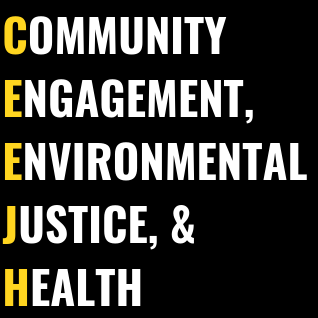Toxic Air in Ivy City, Washington, DC
Ivy City residents, Empower DC community organizers, and legal aids gather in front of the city courthouse ahead of a 2012 hearing in the BENNETT, VAUGHN, et al. Vs. UNION STATION REDEVELOPMENT CORPORATION, et al. case.
Washington DC map of race and ethnicity (2014) where red indicates the white population and blue indicates the black population. Black stars are the three closest DDOE (District Department of the Environment) monitoring stations. Demographic map taken from Wikipedia.
The Ivy City Right to Breathe Partnership brings together members from grassroots organizations such as the Ivy City Civic Association and Empower DC, a neighborhood community, and universities including Howard University, the University of Maryland-College Park, Trinity Washington University, and George Washington University to work for Environmental Justice in a traditionally African American neighborhood in the nation’s capital. Ivy City is home to the Crummell School, one of the first black schools in Northeast Washington, DC (pictured below). The school was abandoned in 1980, and the neighborhood has undergone decline. For over ten years, grassroots organization Empower DC and the Ivy City Civic Association have been working to uplift the neighborhood and maintain it as a close-knit African American community. In 2012, however, the District and Union Station Redevelopment Corporation (USRC) made plans to use the lot around the Crummell School as parking for tour and charter buses. With the neighborhood already bearing the burden of poor air quality from heavy traffic on a major thoroughfare, parking for school buses and garbage trucks, and industry in the neighborhood, the Ivy City Civic Association petitioned the District not to bring more traffic into the neighborhood and to focus instead on developing Crummell as a job training and community center.
Empower DC filed a lawsuit in DC Superior Court to prevent the additional bus parking in Ivy City. In 2013, university partners collected additional air quality data that were presented both to the neighborhood and as part of a testimony. Empower DC raised visibility about Ivy City’s story, and coordinated testimonies from the neighborhood.
from The Washington Post : “Tony Crews, left, Antwan Williams, Burke ‘YB’ Davis, and Willis Little stand in front of the closed Crummell School, in 2016. The Ivy City residents want to transform the shuttered school into a community center surrounded by a playground, basketball court and other public resources. But the city favors a plan from developers who would create a community center in the school but develop the surroundings into mixed-rate housing, industrial space and possibly an ‘urban farm.’ (Nikki Kahn/The Washington Post)”
These efforts have kept the buses out for two years, and in 2014, the DC City Council passed a budget including $10 million for the restoration of Crummell School as a community center and for measures to green Ivy City. While the injunction preventing bus parking at Crummell was overturned, the lot has yet to be used as the District and USRC had planned. The Ivy City Right to Breathe Partnership provided air quality data and analysis that strengthened Ivy City’s case. Empower DC contacted Habitat for Humanity, who hosted air quality monitors from the University of Maryland and Trinity Washington University in Habitat’s Ivy City warehouse for several months in 2013. The warehouse is located on the same street as a parking lot for the District’s school buses and parallel to a major thoroughfare, New York Avenue. The Partnership monitored black carbon (BC) and particulate matter (PM 2.5 ).
The Partnership’s data showed that residents of Ivy City are exposed to higher levels of PM 2.5 than at the closest US EPA monitoring station, and that over the course of a year, PM 2.5 in Ivy City may exceed the EPA’s annual limit. These preliminary data, and future monitoring, will be part of the conversation as the District greens Ivy City and implements measures to improve air quality.



